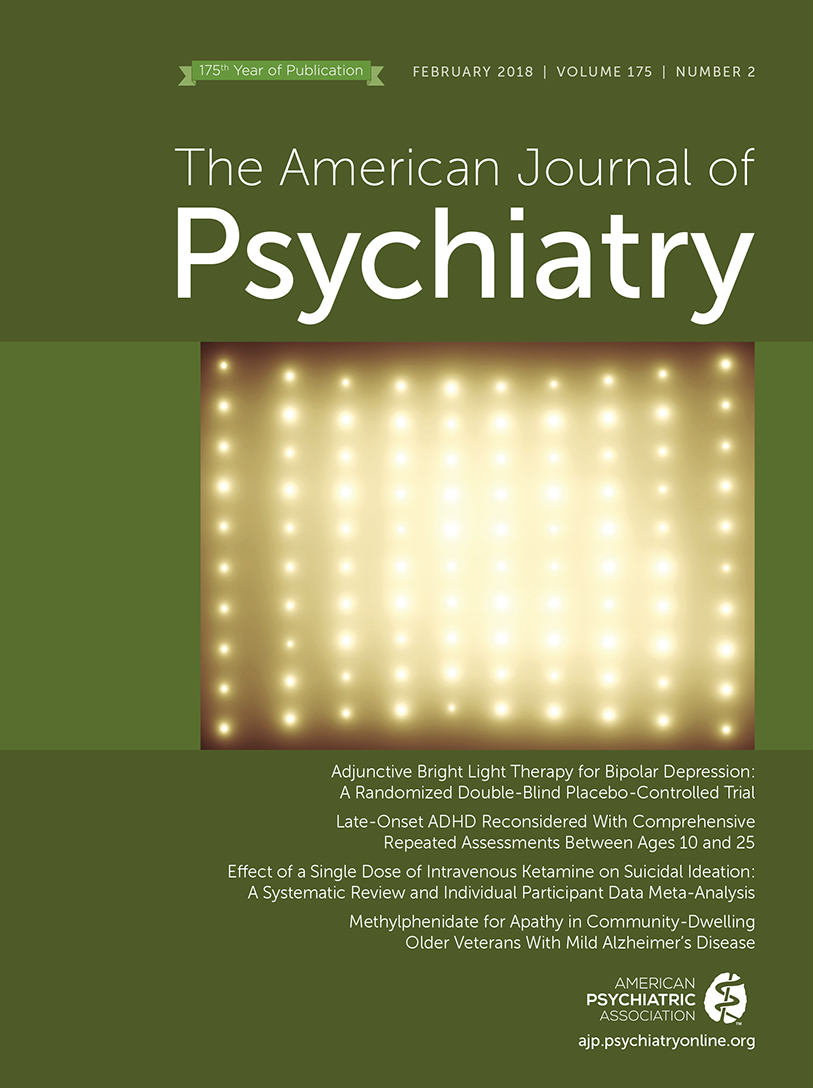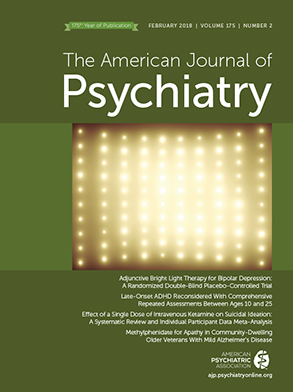Suicide is a serious public health concern, with over 40,000 Americans dying by suicide each year, and almost 800,000 individuals worldwide (
1,
2). While age-adjusted all-cause death rates in the United States have been declining, the number of deaths due to suicide has steadily increased over the past 15 years (
3). In 2013, approximately 1.3 million people in the United States attempted suicide during the past year, and twice as many individuals made a plan about how they would attempt suicide (
2).
Most individuals who have suicidal thoughts and behaviors report psychiatric conditions, most notably mood disorders. Mood disorders are treatable conditions, and often the suicidal thoughts and behaviors improve with improvement of the mood disorder. However, treatments for major depressive disorder and bipolar disorder can take several weeks to work. Even with treatments that have shown improvements specifically in targeting suicidal thoughts and behaviors, the time to improvement is not fast enough in patients who are at serious imminent risk of suicide. Because of this national crisis and the lack of available acute treatments, the National Action Alliance for Suicide Prevention has emphasized the need for fast-acting interventions to reduce suicide and suicidal behaviors (
4).
The study by Wilkinson and colleagues reported in this issue (
5) is well designed, comprehensive, and timely, as it is the first meta-analysis to examine the use of a fast-acting agent to reduce suicidal thoughts. The study demonstrated that ketamine led to a greater reduction in suicidal ideation following a single intravenous infusion compared with placebo controls (saline or midazolam) in individuals with suicidal ideation and treatment-refractory major depressive disorder, bipolar disorder, or posttraumatic stress disorder. Notably, this reduction was immediate (by day 1), and it persisted up to 7 days after a single infusion.
While this study provides some preliminary evidence that ketamine may have potential as a fast-acting treatment for reducing suicidal ideation, the enthusiasm surrounding antisuicidal effects of ketamine must be tempered by several limitations, some noted by the authors. This is the first meta-analysis of individual patient-level data on the effect of ketamine in adults with suicidal ideation, but the overall sample size is still relatively small. In addition, several of the trials specifically excluded participants with clinically serious suicidal risk.
Another important consideration is that the meta-analysis assesses outcomes that were restricted to suicidal ideation, which were single items within depression severity rating scales. Use of single-item measures to assess suicidality is fraught with its own risk. The items assessing suicidal ideation in clinician-rated scales or self-report scales of depression severity are grossly inadequate for measuring suicide risk. Currently available measures of suicidal risk incorporate assessment not only of the severity of suicidal ideation, but also of its frequency and intensity, as well as associated risk factors for suicide, such as hopelessness, lack of social support, pessimism, and so on (
6,
7).
Furthermore, and more importantly, reduction in suicidal ideation is not equivalent to reduction in suicide attempt or death by suicide. Thus, the treatment outcome for antisuicidal treatments cannot just be reduction in self-reported suicidal ideation. To address the public health problem of increasing suicide rates, the targeted treatment outcome should be reduction in suicidal behaviors (i.e., actual suicide attempt, interrupted or aborted attempt, or preparatory behaviors) (
8). Hence, ongoing clinical trials that are testing ketamine or similar rapid-acting antidepressants for suicidal ideation will need to include detailed assessments of suicidality as a key treatment outcome, rather than relying on single items from measures of depression severity. These studies will need to further elucidate the effect of ketamine or similar agents in reducing suicide and suicide attempts.
Wilkinson and colleagues attempt to address the issue of pseudospecificity, creating a distinction between improvement of suicidal ideation and changes in depression severity. They commendably report that change in suicidal severity was strongly correlated with change in overall depression severity, but they found that ketamine’s effect on suicidal ideation remained significant even after controlling for depression severity. It is difficult to interpret this finding, in light of a few factors. First, it is unclear whether the statistical method for evaluating the interaction is the most effective method. Second, the majority of the studies were for treatment of major depression (k=5), and only one study recruited participants specifically at imminent risk for suicide, making it challenging to disentangle the relationship between major depression and suicidal ideation.
Finally, the length of study is an important consideration. The results indicate a reduction in suicidal ideation by day 1, with improvements persisting for 7 days. However, whether the improvements persist over the longer term is unknown. Is the suggestion that ketamine may be an effective immediate intervention, and that alternative strategies (medications, ECT, specific psychotherapies) should be initiated to sustain effects in the long term? No controlled trials have been reported on long-term outcomes of ketamine either alone or in combination with other treatments. A recent study reported greater reduction in suicidal ideation with ketamine as compared with midazolam, which was partially accounted for by improvement in depression severity (
9). However, the outcomes in the controlled trial were reported only for postinfusion day 1, and outcomes up to 6 weeks were reported only for those participants who received ketamine.
Although there are clear limitations in the Wilkinson et al. study, it is an important first step in the search for fast-acting treatments to reduce suicide. As the authors point out, we are not quite at the stage of using ketamine clinically in emergency departments or clinic office settings to reduce imminent suicidal risk. However, the results clearly signal the potential for ketamine, as well as the need for additional studies that include participants at high risk for suicide, outcomes specifically related to suicidal behaviors, and long-term follow-up. Until such studies are done to address longer-term effects on suicidal behaviors in addition to suicidal ideation, routine clinical use of ketamine infusion as an acute treatment for suicidal patients would be premature.

